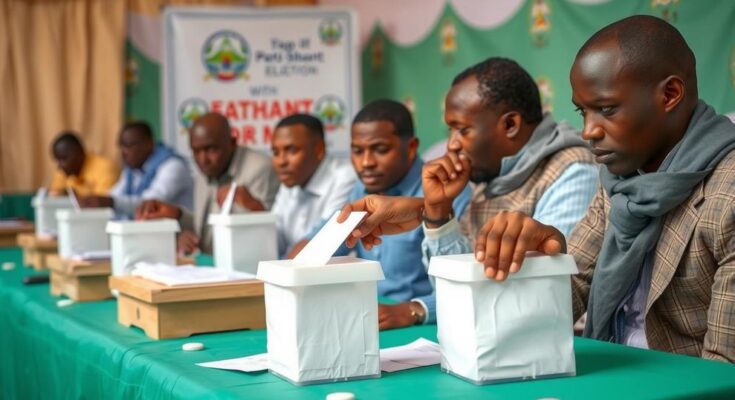Voting is underway in Chad’s first parliamentary election in 13 years, framed by the government as a transition from military rule. Opposition parties have called for a boycott, citing a lack of legitimacy. Low turnout has been reported in the capital, while the elections are viewed as crucial for local communities facing socioeconomic challenges.
Voting is currently underway in Chad’s first parliamentary election in over 13 years, regarded by the government as a pivotal step towards transitioning away from military rule. The election enables citizens to select not only a new parliament but also provincial assemblies and local councils in one of the world’s poorest nations. However, the opposition has called for a boycott of the elections, claiming that the outcomes have been predetermined and expressing skepticism about the legitimacy of the process.
In the capital, N’Djamena, voter turnout was notably low when polling stations opened. Officials attributed the apathy to cold weather conditions experienced on the voting day. The boycott led by opposition parties aims to discourage the participation of Chad’s eight million eligible voters in an electoral process they contend lacks genuine fairness. This situation may benefit candidates affiliated with President Mahamat Idriss Deby Itno, who ascended to power through military means in 2021 and subsequently gained legitimacy through a presidential election earlier this year, which was criticized as fraudulent.
President Deby made a public call for citizens to vote, describing the day as historic. Contrarily, Succes Masra, an opposition leader, claimed that fabricated results were already prepped in advance. Despite the resistance, some voters expressed hopes for significant changes following the elections. In an effort to address logistical difficulties, military personnel and nomads voted the day prior to the general polling, with reports indicating significant participation among these groups.
Much is at stake for local communities in this electoral process. From the perspective of nomads facing the adverse impacts of climate change, there is a pressing need for improvement in their living conditions. Polling stations are currently under the observation of approximately 100 foreign election monitors tasked with ensuring a fair voting process. However, allegations of malpractices persist, including reports from opposition groups regarding the disappearance of ballots in certain regions.
Voting occurs amidst a backdrop of regional instability and ongoing security threats, including attacks from the Boko Haram group and accusations regarding Chad’s involvement in the conflict in Sudan. The government has positioned these elections as the concluding phase in a journey toward democratic governance, aiming to solidify Deby’s hold on power following his father’s three-decade rule that ended in 2021.
Chad has faced prolonged political instability, particularly following the death of longtime leader Idriss Deby in 2021. The country’s return to parliamentary elections represents an effort by the current government, led by his son Mahamat Idriss Deby Itno, to establish a legitimate political framework after years of military control. The opposition has vehemently criticized the electoral process, fearing a lack of genuine competition and transparency. Additionally, Chad’s economic challenges and social issues are compounded by environmental changes and regional security threats, rendering these elections particularly significant for the nation’s future.
In conclusion, Chad’s parliamentary elections are characterized by significant opposition discontent and prevalent skepticism regarding the integrity of the process. With low voter turnout and a boycott by several opposition parties, the outcomes may heavily favor candidates aligned with the ruling government. The situation highlights the pressing need for genuine democratic reforms in a nation grappling with economic despair and security challenges. The international community continues to watch closely, given the implications these elections hold for Chad’s political landscape.
Original Source: www.aljazeera.com




